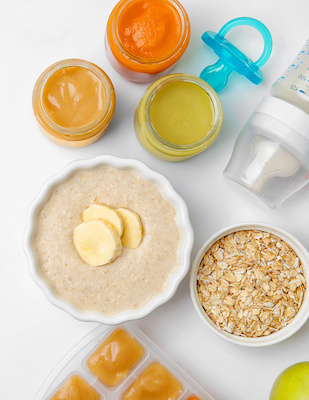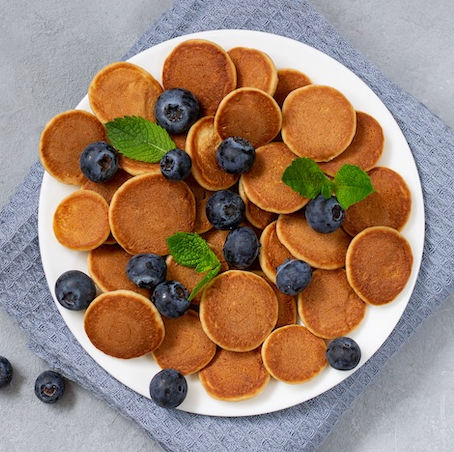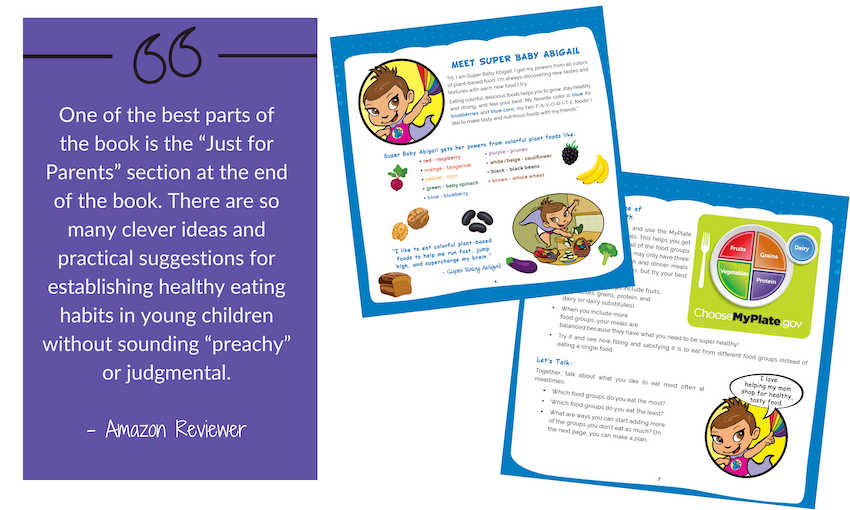
This list of over 25 breakfast ideas for a 1-year-old is filled with options for all flavor preferences, making mealtime easier each week!
Feeding a toddler is no small feat. It may involve tears (possibly from parents) and food splatters on EVERY surface. But, while the process may be challenging, introducing your child to a variety of foods can help diversify their palate, jumpstart healthy habits, and provide a balance of nutrients that enables proper development. Check out these tasty breakfast ideas that the entire family can enjoy, including your little one!
25+ Breakfast Ideas for a 1-Year-Old
Feeding a 1-year-old shouldn’t be any different than how you feed yourself. Yup, that includes whole grains, colorful fruits, hearty vegetables, and healthy protein sources. But be mindful of choking hazards and take precautions by chopping, mashing, or cutting foods into small pieces for your youngster to enjoy safely. Here’s a complete list of 25+ breakfast ideas.
- Scrambled eggs + avocado + ¼ to ½ small banana (mash or chopped if needed)
- Mini omelet with spinach, diced bell peppers, and onions
- Mini omelet with basil, tomato, and fresh mozzarella
- Scrambled eggs + whole wheat tortilla
- Home fries + spinach omelet
- Egg muffins with tomatoes, spinach, and cheddar cheese
- Broccoli and cheese omelet
- Mini Frittata
- Overnight oats: Rolled oats + plain whole-milk Greek or regular yogurt, whole milk, bananas, unsweetened cocoa powder, and cinnamon
- Overnight oats: Rolled oats + plain whole-milk Greek or regular yogurt, whole milk, blueberries, sliced strawberries, and a drizzle of maple syrup
- Overnight oats: Rolled oats + plain whole-milk Greek or regular yogurt, whole milk, nut butter, diced peaches, cinnamon, and a drizzle of maple syrup
- Overnight oats: Rolled oats + plain whole-milk Greek or regular yogurt, whole milk, nut butter, unsweetened cocoa powder, sliced strawberries, and a drizzle of maple syrup
- Oatmeal + plain whole-milk Greek or regular yogurt with diced strawberries
- Oatmeal + pureed peach with nutmeg
- Oatmeal + bananas and a sprinkle of unsweetened cocoa powder
- Oatmeal flour pancakes + strawberry compote
- Baked oatmeal bars with blueberries
- Baked apples with cinnamon + plain whole-milk Greek or regular yogurt
- Pumpkin pancakes made with whole wheat flour + warm apple compote + pumpkin pie spice
- Sweet potato waffles + nutmeg and cinnamon
- Baked French toast sticks using whole wheat bread + apple compote
- Whole wheat bread topped with peanut butter and banana slices
- Whole wheat English muffin + scrambled eggs + tomato salsa
- Zucchini pancakes + Greek yogurt topping
- Blueberry muffins made with whole wheat flour
- Banana bread with almond butter
Curious about how specific breakfast foods benefit your 1-year-old? Refer to the categories below for nutrient breakdowns and how to reach your child’s recommended needs.
Eggs for Your 1-Year-Old
Whether you’re cutting up a hard-boiled egg for breakfast or simply scrambling them for finger food, it’s an egg-cellent addition to your breakfast routine. Eggs are a savory and satisfying breakfast that can get easily prepared in a variety of ways. So, which cooking method is your favorite?
- Hard-boiled
- Sunnyside up
- Scrambled
- Omelets
- Deviled eggs
Eggs are one of the best dietary sources of choline—an essential nutrient that enables your child’s brain development. While your liver does naturally synthesize choline in small amounts, it’s necessary to consume choline in the diet to maintain good health.
Just one egg provides 147 mg of choline, equating to 27% and 35% of the daily recommended dietary intake for adult men and women, respectively. As for children, the requirements are as follows:
- Infants, 7-12 months – 150mg/day
- Toddlers, 1-3 years old – 200mg/day
Eating just one egg provides your toddler with 74% of their daily recommended dietary intake of choline. (1) Is your child allergic to eggs? No worries! Other sources of choline include beef, fish, poultry, dairy, soybeans, potatoes, wheat germ, kidney beans, and quinoa. (1,2)
Egg-cellent breakfasts ideas (as listed above):
- Scrambled eggs + avocado + ¼ to ½ small banana (mash or chopped if needed)
- Mini omelet with spinach, diced bell peppers, and onions
- Mini omelet with basil, tomato, and fresh mozzarella
- Scrambled eggs + whole wheat tortilla
- Home fries + spinach omelet
- Egg muffins with tomatoes, spinach, and cheddar cheese
- Broccoli and cheese omelet
- Mini Frittata
Benefits of Oatmeal
Oatmeal is a classic breakfast staple and one of our favorite options of these breakfast ideas for a 1-year-old. It’s incredibly versatile and can get served with a variety of tastes and textures. Whether you’re enjoying a steaming bowl of steel-cut, Scottish oats, or rolled oats, this heart-healthy grain is a satisfying favorite. Get creative and transform it into porridge, overnight oats, granola, or baked goods such as muffins or cookies.
Oats pack a nutritious punch, as shown by their many health benefits. Specifically, their high-fiber content helps reduce the risk of heart disease and diabetes and promotes gastrointestinal health. (3)
Overnight sensations (Overnight oats):
- Rolled oats + plain whole-milk Greek or regular yogurt, whole milk, bananas, unsweetened cocoa powder, and cinnamon
- Rolled oats + plain whole-milk Greek or regular yogurt, whole milk, blueberries, sliced strawberries, and a drizzle of maple syrup
- Rolled oats + plain whole-milk Greek or regular yogurt, whole milk, nut butter, diced peaches, cinnamon, and a drizzle of maple syrup
- Rolled oats + plain whole-milk Greek or regular yogurt, whole milk, nut butter, unsweetened cocoa powder, sliced strawberries, and a drizzle of maple syrup

Fiber-rich oatmeal dishes:
- Oatmeal + plain whole-milk Greek or regular yogurt with diced strawberries
- Oatmeal + pureed peach with nutmeg
- Oatmeal + bananas and a sprinkle of unsweetened cocoa powder
Feel like having oatmeal in a new way? Try these!
- Oatmeal flour pancakes + strawberry compote
- Baked oatmeal bars with blueberries
Spices to Add to Your Baby’s Breakfasts
Spices can revolutionize meals by adding a burst of bold flavors, vitamins, and antioxidants. They are also rich in phytonutrients which can help support brain and immune function while combating inflammation. For example, cinnamon, contains antibacterial, anti fungal, and blood glucose-lowering properties that may help reduce overall disease risk. Benefits for the whole family – so, don’t be shy with the spices! Try different combinations to find your favorite new flavor combo.
Spiced breakfast creations:
- Baked apples with cinnamon + plain whole-milk Greek or regular yogurt
- Pumpkin pancakes made with whole wheat flour + warm apple compote + pumpkin pie spice
- Sorghum or buckwheat pancakes with blueberries (cut in quarters or mash)
- Sweet potato waffles + nutmeg and cinnamon

Fiber-Rich Focus – Whole Grains, Fruits, and Veggies
What do whole grains, fruits, and vegetables all have in common? They are all filled with lots of hearty fiber and a variety of nutrients that promote positive health outcomes. Whole grains consist of three components:
- bran
- germ
- endosperm
On the other hand, refined grains only contain the endosperm. But, removing the bran and germ also eliminates key nutrients such as B-vitamins, iron, and fiber. Easy fix–choose “brown bread,” right? Think again! Some bread can look brown because they contain molasses or other similarly colored ingredients. Don’t forget to read the nutrition facts and ingredients list on the package to feel confident about your food choices.
When looking at the ingredients list, look for the words “whole” or “whole grain.” They are often one of the first words on the list. Check out the recipes below for how to add whole grains, fruits, and veggies to your next breakfast! (4)
Whole-wheat winners
- Baked French toast sticks using whole wheat bread + apple compote
- Whole wheat bread topped with peanut butter and banana slices
- Whole wheat English muffin + scrambled eggs + tomato salsa
Fruit and veggie-focused breakfast ideas
- Zucchini pancakes + Greek yogurt topping
- Blueberry muffins made with whole wheat flour
- Banana bread with almond butter
Special Dietary Needs or Allergies?
Is your toddler allergic to mealtime staples such as dairy products, whole grains, or eggs? Don’t stress! Check out these easy substitutions to help reach your child’s needs to promote healthy growth and development.
Dairy-free baby
Instead of cow’s milk, try almond, soy, hazelnut, hemp, cashew, pea, macadamia, quinoa, or oat milk. Dairy-free alternatives for yogurt are also available to satisfy all of your breakfast needs. But if you are worried about your dairy-free child’s calcium or protein intake, don’t fret! Soy milk can provide your growing toddler with adequate calcium and protein. Just be sure to look for soy milk that is unsweetened and fortified with calcium and vitamin D. (5,6)
Gluten-free baby
Gluten-free options include:
- almond flour
- buckwheat flour
- sorghum flour
- amaranth flour
- teff flour
- arrowroot flour
- brown rice flour
- cassava flour
- tapioca flour
- coconut flour
Plus, go-to breakfast options such as tortillas, bread, and English muffins are readily available gluten-free. For parents or guardians who love to cook, experiment with the fours in the list above to create a homemade alternative to a classic favorite.

Egg-free baby
Instead of eggs, you can use mashed bananas, applesauce, flaxseed eggs, silken tofu, aquafaba, or a commercial egg replacer.
Looking for some more resources on how to feed your toddler in addition to these 25+ breakfast ideas for a 1-year-old? Check out these articles for some great ideas and inspiration:
- Food and Meals for a One Year Old Baby & Toddler
- Sample Daily Menu For Your 1 Year Old Child
- How Much Should My Toddler Eat?
- Part 1 of 2: Feeding Solids to Your Baby During the First Year of Life
- Part 2 of 2: Feeding Solids to Your Baby During the First Year of Life
This article was updated in January 2025 from its original publish date in June 2021.












